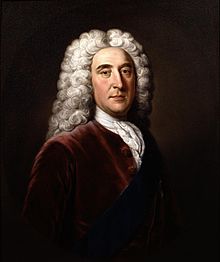The Duke of Newcastle | |
|---|---|
 Portrait by William Hoare, c. 1750 | |
| Prime Minister of Great Britain | |
| In office 29 June 1757 – 26 May 1762 | |
| Monarchs | |
| Preceded by | The Duke of Devonshire |
| Succeeded by | The Earl of Bute |
| In office 16 March 1754 – 11 November 1756 | |
| Monarch | George II |
| Preceded by | Henry Pelham |
| Succeeded by | The Duke of Devonshire |
| Personal details | |
| Born | 21 July 1693 London, England |
| Died | 17 November 1768 (aged 75) Lincoln's Inn Fields, England |
| Resting place | All Saints Churchyard, Laughton, East Sussex, England |
| Political party | Whig |
| Spouse | |
| Parent |
|
| Alma mater | Clare College, Cambridge |
| Signature | |
Thomas Pelham-Holles, 1st Duke of Newcastle upon Tyne and 1st Duke of Newcastle-under-Lyne KG PC FRS (21 July 1693 – 17 November 1768) was an English Whig statesman who served as Prime Minister of Great Britain, and whose official life extended throughout the Whig supremacy of the 18th century. He is commonly known as the Duke of Newcastle.[1]
A protégé of Robert Walpole, he served under him for more than 20 years until 1742. He held power with his brother, prime minister Henry Pelham, until 1754. He had then served as a Secretary of State continuously for 30 years and dominated British foreign policy.
After Henry's death, Newcastle was prime minister for six years in two separate periods. While his first premiership was not particularly notable, Newcastle precipitated the Seven Years' War, and his weak diplomacy cost him his premiership.[2] After his second term, he served briefly in Lord Rockingham's ministry, before he retired from government. He was most effective as a deputy to a leader of greater ability, such as Walpole, his brother, or Pitt. Few politicians in British history matched his skills and industry in using patronage to maintain power over long stretches of time. His genius appeared as the chief party manager for the Whigs from 1715 to 1761. He used his energy and his money to select candidates, distribute patronage and win elections. He was especially influential in the counties of Sussex, Nottinghamshire, Yorkshire and Lincolnshire. His greatest triumph came in the 1754 election.[3]
Outside the electoral realm, his reputation has suffered. Historian Harry Dickinson says that he became
[n]otorious for his fussiness and fretfulness, his petty jealousies, his reluctance to accept responsibility for his actions, and his inability to pursue any political objective to his own satisfaction or to the nation's profit ... Many modern historians have depicted him as the epitome of unredeemed mediocrity and as a veritable buffoon in office.[4]
- ^ Chisholm 1911.
- ^ Basil Williams, The Whig Supremacy 1714-1760 (2nd ed. 1962) pp 352–353.
- ^ Williams, The Whig Supremacy 1714–1760 (1962) pp 28–29.
- ^ Harry T. Dickinson, "Newcastle" in David Loads, editor, Readers Guide to British History (2003) 2:951–952